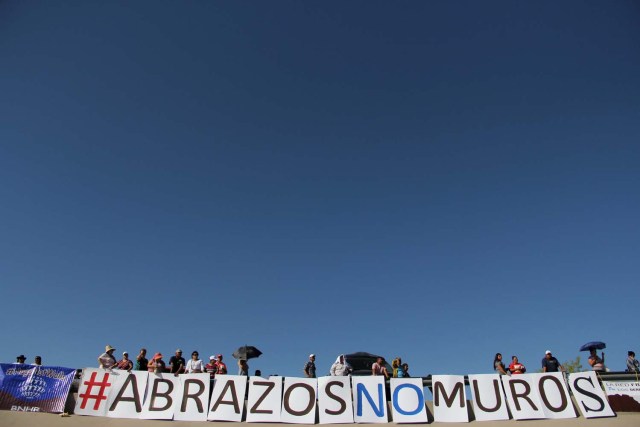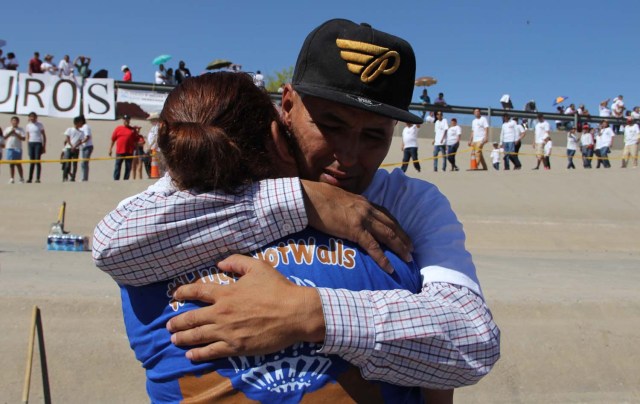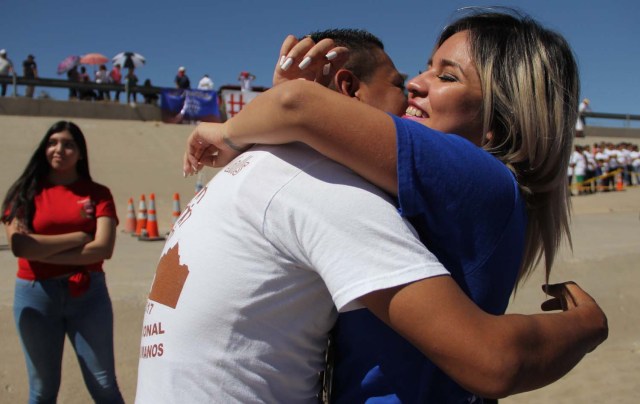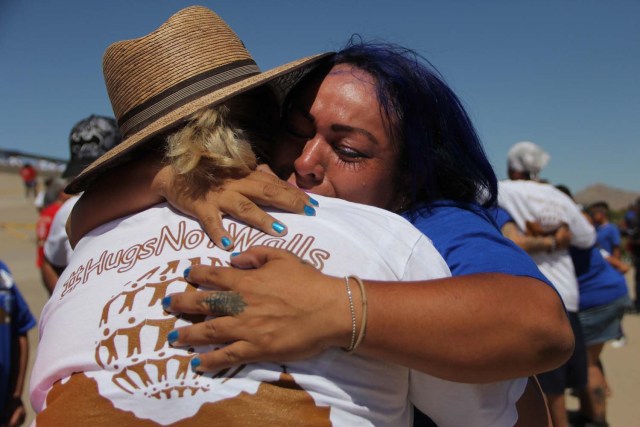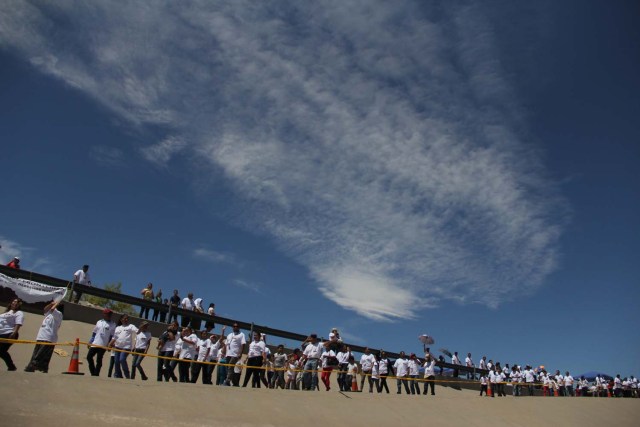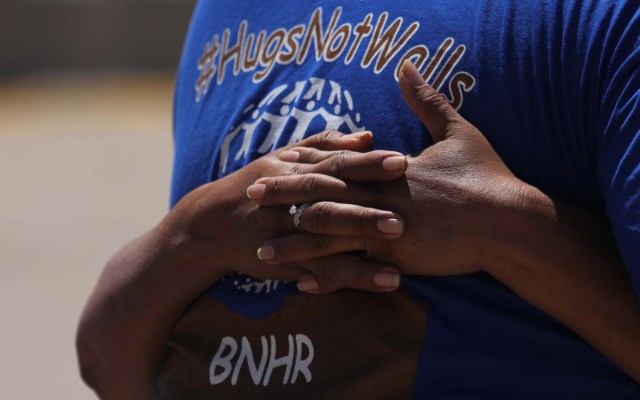
Durante tres minutos, Iván abrazó a su familia, se olvidó del miedo, acortó las distancias y venció el muro entre México y Estados Unidos que tanto promueve el presidente Donald Trump.
En la línea fronteriza, sobre un afluente seco en el desierto del curso de agua que Estados Unidos llama Río Grande y México Río Bravo, la familia de Iván Castañeda volvió a estar junta por primera vez desde que, hace un mes, sufriera el trauma de la separación
“¿Por qué no te vas con nosotros?”, le pregunta su hijo de 4 años.
Exsoldado del ejército mexicano, Iván, de 40 años, fue deportado hace dos semanas de Estados Unidos, adonde huyó con su familia de la violencia en México.
“No sé qué podría decirles con palabras a mis hijos, mi corazón es el que sabe. Ser padre es la mejor bendición, pero es bien triste saber que yo no puedo ofrecerles nada aquí, más que muerte y dolor”, comenta para la AFP.
– “Un acto de protesta” –
La de Iván, es una de las miles de familias de migrantes mexicanos que viven separadas por la frontera.
Pero este fin de semana, 310 de ellas pudieron abrazarse durante tres minutos bajo el candente sol y sobre la línea que separa a la mexicana Ciudad Juárez, en Chihuahua, de la estadounidense El Paso, en Texas, gracias al evento “Abrazos, No Muros”, organizado por la ONG Red Fronteriza por los Derechos Humanos.
Se trata de la quinta edición de este evento que ha permitido que 1.252 familias separadas se reúnan brevemente, en una preciada ocasión que aprovechan para pedirse perdón, llorar juntos, reír, hablar o tomarse fotos, después de, en algún caso, hasta 26 años sin verse.
“Cada abrazo es un acto de protesta”, asegura Fernando García, organizador del evento.
Trump llegó a la Casa Blanca con la promesa de deportar a millones de indocumentados y levantar una nueva muralla fronteriza para evitar la llegada de migrantes sin papeles, a quienes ha calificado de criminales.
– Huyendo del narco –
Iván abrió hace un mes la puerta de su casa en Denver, Colorado, para ir a trabajar en la construcción. Pero agentes de migración estaban escondidos detrás de su camioneta para detenerlo y deportarlo.
Desde entonces no veía a su esposa y a sus cinco hijos de entre dos y 13 años, quienes tuvieron que quedarse.
Este fin de semana, se abrazaron en la tierra natal de Iván, Chihuahua, una violenta zona disputada por los cárteles de Juárez y Sinaloa que trafican droga a Estados Unidos.
En ese lugar Iván fue militar durante seis años, pero asegura que se cansó de la corrupción, las violaciones y hasta los asesinatos que cometían los castrenses, incluso contra sus propios compañeros.
Pidió tres veces ser dado de baja, pero en lugar de eso lo ascendían, hasta que en 2003 desertó.
Entonces, el brazo armado del cártel de Juárez buscó reclutarlo.
“Yo no me negué, yo dije que sí. En el momento no puedes decirles que no, porque puede haber represalias. Tomé a mi familia y crucé de ilegal” a Estados Unidos, cuenta.
Pero los deportaron, y como venganza, los criminales atacaron a balazos a su madre en 2012.
Entonces decidió pedir asilo en Estados Unidos, donde trabajó duro durante años para pagar casi 15.000 dólares al abogado que llevaba su caso. Pero éste olvidó acudir a una cita en la corte y apelar su repatriación, por lo que Iván fue detenido y trasladado por 15 días a un centro de detención.
“Ahí hace tanto frío que en verdad no puedes dormir, te amarran de tus manos, de tu cintura, de tus pies, te tienen como un animal, durmiendo en el piso. Habíamos 200, 300 personas, en celditas de 60 personas. Si vas al baño, tienes que decirles a las personas, porque están acostadas a un lado de la taza de baño”, recordó.
Ahora vive en Ciudad Juárez, trabajando escondido en un taller mecánico mientras espera la apelación de su caso.
“Quedarme sola otra vez no es nada fácil, yo necesito a mi esposo y mis niños necesitan a su papá”, dijo entre lágrimas Hilda Melissa Martínez, cuando el breve abrazo con Iván tuvo que terminar. AFP
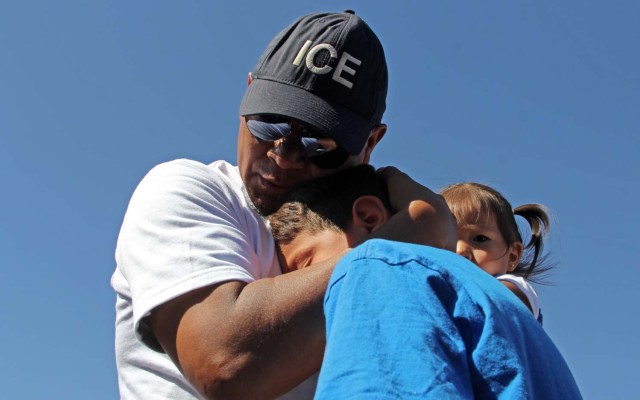
Castaneda was denied a political asylum he requested in 2012 to flee violence in Ciudad Juarez, while his wife, mother and five children remain in Denver, Colorado, United States. / AFP PHOTO / HERIKA MARTINEZ
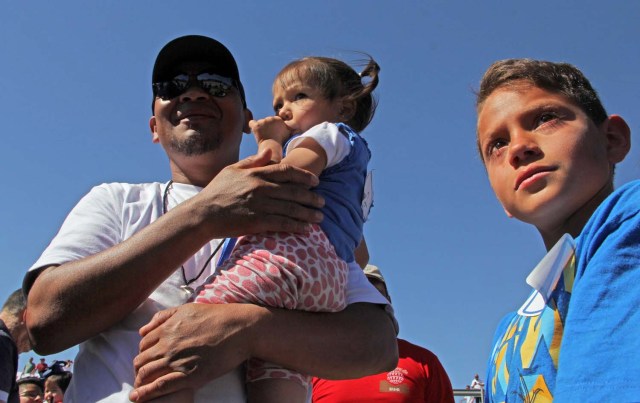
Castaneda was denied a political asylum he requested in 2012 to flee violence in Ciudad Juarez, while his wife, mother and five children remain in Denver, Colorado, United States. / AFP PHOTO / HERIKA MARTINEZ
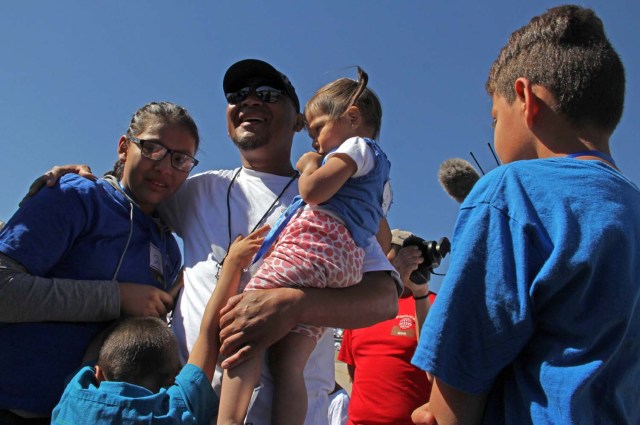
Castaneda was denied a political asylum he requested in 2012 to flee violence in Ciudad Juarez, while his wife, mother and five children remain in Denver, Colorado, United States. / AFP PHOTO / HERIKA MARTINEZ
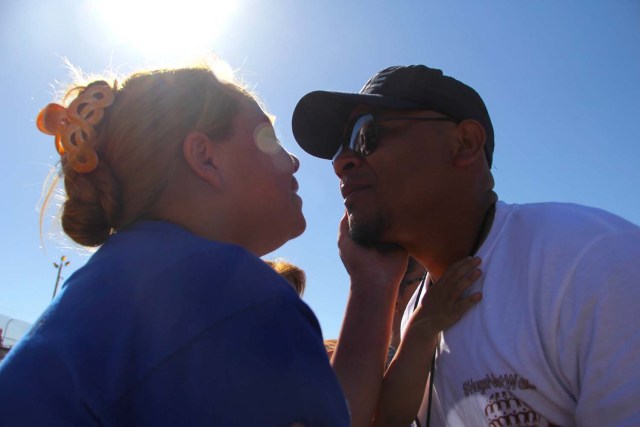
Castaneda was denied a political asylum he requested in 2012 to flee violence in Ciudad Juarez, while his wife, mother and five children remain in Denver, Colorado, United States. / AFP PHOTO / HERIKA MARTINEZ
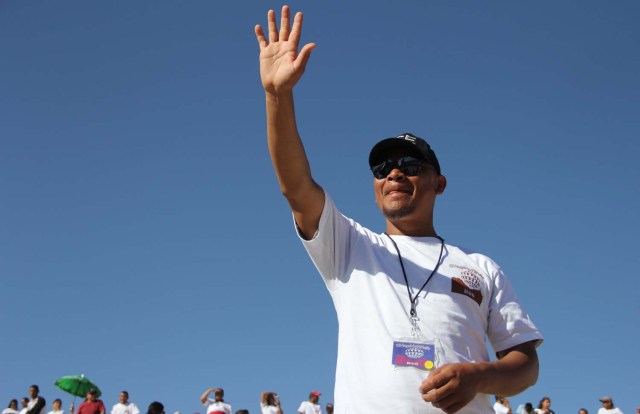
Castaneda was denied a political asylum he requested in 2012 to flee violence in Ciudad Juarez, while his wife, mother and five children remain in Denver, Colorado, United States. / AFP PHOTO / HERIKA MARTINEZ
